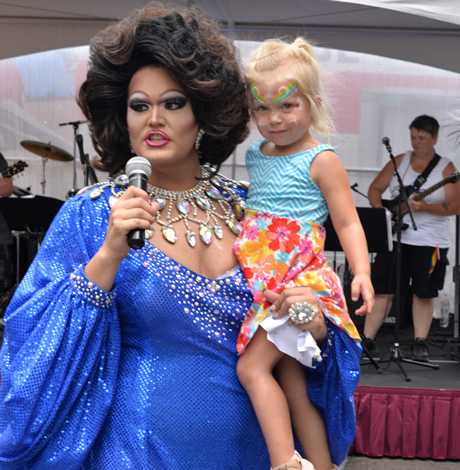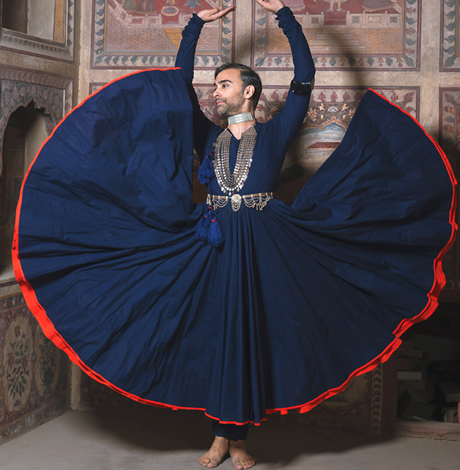Living
Queery: Daniel Phoenix Singh
The gay dancer/choreographer answers 20 gay questions

Dancing for Daniel Phoenix Singh is a passion, a notion with which many artists can relate. So much so, in fact, that he essentially works two full-time jobs to make it happen.
He works in information technology by day (“To pay the bills,” he says) and spends four or five days a week dancing with his eponymous group, the Dakshina/Daniel Phoenix Singh Dance Company, a seven-year-old outfit of 14 dancers that specializes in modern American, classical and traditional Indian dance. Their next performances are next weekend (April 2-3) at Dance Place in Washington where they’ll perform “By the Light,” a dance the late D.C. choreographer Eric Hampton created while suffering the latter stages of the Lou Gehrig’s disease to which he eventually succumbed.
“It’s really about what dance meant to him,” Singh says. Go to danceplace.org for information.
Singh grew up in India but moved to the U.S. when he was 17 in 1990. He chose “Phoenix” as a translation of his middle name because his Indian name was too long to fit on his passport and green card. Dakshina means offering in Sanscrit, a name he chose to honor his company’s Indian roots. Four of its male members, including Singh, are gay. He says queer sensibilities inform his work in several ways.
“I never think of gender in terms of casting,” he says. “I might cast two men for a dance, two women or a man and a woman. It’s whoever does the work the best. It’s very freeing for me. I have a strong interest in social justice that comes from my LGBT sensibilities, and also an awareness of how the arts can be used to speak to something larger. It’s not just something that’s pretty, it’s a way to address something that’s relevant to our lives.”
Singh is single and lives in Petworth. He enjoys reading, napping, chocolate, movies, cooking, working out and biking in his spare time.
How long have you been out and who was the hardest person to tell?
I’ve been out for close to 15 years now. The hardest person to tell was my mother, she didn’t know what gay meant. So it was a bit difficult/humorous to try to explain and come out at the same time — perhaps more humorous in hindsight. When I first came out, it made me reel that someone who loved me so much — that she gave up a comfortable life in India to work 80-90 hours a week so I could have a good education and life — could hate a part of me so unquestioningly because of what her church told her. But she has had a pretty incredible change of heart. Props to my mom, even though she doesn’t understand it completely and is still a pretty conservative Christian, she grew to accept me and love me again.
Who’s your LGBT hero?
Audre Lorde, she lived a composite, nuanced, self-analytical, socially conscious/active, artistic life that I covet.
What’s Washington’s best nightspot, past or present?
Chaos! I loved Chaos and miss the space where people from diverse backgrounds and age groups gathered to dance the night away. My favorite memory of Chaos is when a young guy brought his grandmother to the drag show that happened before the Salsa nights.
Describe your dream wedding.
Intellectually, I’m not sure I believe in the institution of marriage — it’s too hetero-normative for me. But my heart strings still tug when I see a traditional Indian wedding, and I’m always the first person to start crying when a couple begin saying their vows.
What non-LGBT issue are you most passionate about?
I’m very passionate about the arts. I’m concerned that we as a community don’t realize the long-term effects of this steady decline in engaging with the arts whether it is in the K-12, general public, senior citizens or immigrant communities. To me it is inconceivable to define a progressive developed society without the arts having a central role. There is a lot of talk about the loss of nuance, abstraction and engagement in our conversations (both social and political). People often take the most polarized views, everything comes down to a yes/no check box and then they wonder why we can’t get along or move forward. To me, the arts is about the subtleties of life, about finding the gray areas and looking at life from various angles. Most importantly art is about self-reflection and awareness — something critical for us to grow as a society.
What historical outcome would you change?
There are several things I’d like to change. I don’t know where to start.
What’s been the most memorable pop culture moment of your lifetime?
When Dana Fuchs, one of the heroines in “Across the Universe” locked lips with me (among several others) at her concert.
On what do you insist?
Kindness.
What was your last Facebook post or Tweet?
Mornings = Bad.
If your life were a book, what would the title be?
“Artful Mischief.”
If science discovered a way to change sexual orientation, what would you do?
Make everyone poly-sexual? If everyone loved everyone, maybe some of our problems will go away.
What do you believe in beyond the physical world?
I don’t believe in an afterlife — learning to let go of the ego of permanence was a hard lesson for me. But I do believe integrity in our lived lives survives us.
What’s your advice for LGBT movement leaders?
To find a community-based, grassroots solution to our host of issues, instead of trying to create a top-down abstract model. Have stakeholders present in very early planning stages, don’t just invite them as “community sponsors” after the main conversation has finished. And to try to frame issues as more than the hetero-homo binaries.
What would you walk across hot coals for?
My dance company and my friends.
What LGBT stereotype annoys you most?
That we’re here to recruit.
What’s your favorite LGBT movie?
“Milk”
What’s the most overrated social custom?
Clubbing (different from dancing).
What trophy or prize do you most covet?
The MacArthur Fellowship
What do you wish you’d known at 18?
That I should have started dancing earlier.
Why Washington?
Like Goldilocks, it’s just the right size — not too big, not too small.
Real Estate
2026: prices, pace, and winter weather
Lingering snow cover, sub-freezing temperatures have impacted area housing market

The D.C. metropolitan area’s housing market remains both pricey and complex. Buyers and sellers are navigating not only high costs and shifting buyer preferences, but also seasonal weather conditions that influence construction, inventory, showings, and marketing time.
Seasonality has long affected the housing market across the U.S. Activity typically peaks in spring and summer and dips in winter; however, January and February 2026 brought unusually cold spells to our area, with extended freezing conditions.
Persistent snow and ice-covered roads and sidewalks have gone for days, and in some cases weeks, before melting. While snow accumulation normally averages only a few inches this time of year, this winter saw below-normal temperatures and lingering snow cover that has significantly disrupted normal activity.
Rather than relying on neighborhood teenagers to shovel snow to make some extra money, the “snowcrete” has required ice picks, Bobcats, and snow removal professionals to clear streets and alleys, free our cars from their parking spaces, and restore availability of mass transit.
These winter conditions have had an adverse impact on the regional housing market in several ways.
- Construction slowdown: New builds and exterior improvements often pause during extended cold, resulting in delayed housing starts when we need affordable housing in the worst way.
- Listing preparation: Cleaning crews, sign installers, photographers, and stagers with trucks full of furniture may be unable to navigate roads and need to postpone service.
- Showings and open houses: Simply put, buyers are less inclined to schedule visits in hazardous conditions. Sellers must ensure walkways and parking areas are clear and de-iced and be able to vacate the property while viewings are taking place.
- Inspection and appraisal delays: Like buyers and sellers, ancillary professionals may be delayed by unfavorable weather, slowing timelines from contract to close.
- Maintenance and repairs: Properties with winter damage (e.g., ice dams or frozen pipes) may experience repair delays due to contractor availability and supply chain schedules. Snow and cold can also affect properties with older and more delicate systems adversely, leading some sellers to delay listing until better conditions arrive.
- Availability of labor: Increasingly, construction, landscaping, and domestic workers are reluctant to come into the District, not because of ice, but because of ICE.
Overall, the District has shown a notable increase in days on the market compared with past years. Homes that once sold in a week or less are now often listed for 30+ days before obtaining an offer, especially in the condominium and mid-range house segments. While part of this shift can be attributed to weather and climate, interest rates, uncertain employment, temporary furloughs, and general economic conditions play key roles.
Nonetheless, we continue to host some of the region’s most expensive residences. Historic estates, including a Georgetown mansion that sold for around $28 million, anchor the luxury segment and reflect ongoing demand for premium urban property.
But even in this high-end housing sector, marketing strategies are evolving based on seasonal realities. Price reductions on unique or niche properties, such as undersized or unconventional homes, reflect a broader market adjustment where competitive pricing can shorten selling time.
For example, a beautifully renovated, 4-story brick home with garage parking and multiple decks that overlook the Georgetown waterfront sold in early February for 90 percent of the list price after 50 days on the market.
At the other end of the spectrum, a 2-bedroom investor-special rowhouse in Anacostia only took eight days to sell for under $200,000, down 14 percent from its original list price. In addition, four D.C. homes took more than 250 days to sell, including an 8-bedroom rooming house that was on the market for 688 days and closed after a 23 percent downward price adjustment.
Some frustrated sellers are simply taking their homes off the market rather than dropping prices below their mortgage balances, although we are beginning to see the resurgence of short sales for those who must sell.
Condominiums and cooperatives offer many opportunities for buyers and investors, with 1,100 of them currently on the market in D.C. alone. List prices run the gamut from $55,000 for a studio along the Southwest Waterfront to nearly $5 million for five bedrooms, four full baths, and 4,400 square feet at the Watergate.
So, while Washington metro area prices remain high, the pace of sales now reflects both seasonal and economic realities. Homes taking longer to sell, in part caused by elements of winter, signal a shifting market where buyers can take more time to decide which home to choose and have a better negotiating posture than in recent years.
Accordingly, sellers must continue to price strategically, primp and polish their homes, and prepare for additional adverse circumstances by reviewing fluctuating market conditions with their REALTOR® of choice.
Valerie M. Blake is a licensed Associate Broker in DC, MD & VA with RLAH @properties. Call or text her at (202) 246-8602, email her at [email protected] or follow her on Facebook at TheRealst8ofAffairs.
Autos
Going for gold: Ford Bronco Sport vs. Toyota RAV4
SUV world has share of bright lights, bold entrances, cut-throat competitors

Let the games begin! Just like the Winter Olympics this month, the SUV world has its share of bright lights, bold entrances, and cut-throat competitors.
Enter the Ford Bronco Sport and Toyota RAV4, both ready to claim the podium but each with a different routine. Think hiking boots versus minimalist trainers. Dirt trails versus perfectly paved roadways.
FORD BRONCO SPORT
$34,000
MPG: 25 city/30 highway
0 to 60 mph: 8.2 seconds
Cargo space: 32.5 cu. ft.
PROS: Boxy chic. Off-road ready. Easy-clean interior.
CONS: Meh gas mileage. Firm ride. Outside noise.
The Bronco Sport doesn’t try to blend in — and that’s the point. With an upright stance, squared lines and retro-rugged styling, this compact SUV looks ready for a backcountry photoshoot before you’ve even left the driveway.
Power comes from a three-cylinder turbo engine that handles daily driving with ease. Opt for the four-cylinder turbo, and the personality shifts from relaxed to assertive. Passing power improves. Highway merges are confident rather than cautious.
The standard 4×4 system sets the tone immediately. Traction is constant. Confidence is built in. Add the G.O.A.T. drive trains (in Ford cute-speak, this means “Goes Over Any Terrain”), and the Bronco Sport adapts to mud, sand, snow and rocks like a decathlete moving between events. Higher trims add skid plates, upgraded suspension and special hardware that makes rough territory feel less intimidating.
On pavement, the Bronco Sport is stable and composed, though the firm suspension can be ass-busting over deep potholes and such. And wind noise at highway speeds is kinda annoying, a tradeoff for the boxy profile.
Inside, durability meets thoughtful design. Rubberized surfaces and easy-clean materials welcome muddy boots, sandy paws or ambitious weekend projects. The cargo area features a flip-up rear window and adjustable floor, making it a breeze to load gear. Storage cubbies and nylon straps keep equipment organized without fuss.
Safety and other tech amenities are modern and practical. Wireless smartphone integration, cameras and driver-assistance gizmos such as adaptive cruise control make daily driving and long trips easier to manage.
What truly sets this SUV apart? In a sea of aerodynamic lemmings, the Bronco Sport feels like a free spirit. Rugged. Confident. A little rebellious.
And, like alpine skier Breezy Johnson, it looks particularly good with a bit of trail dust.
TOYOTA RAV4

$34,000
MPG: 47 city/40 highway
0 to 60 mph: 7.1 seconds
Cargo space: 37.8 cu. ft.
PROS: Fuel savvy. Spacious. Tech-laden features.
CONS: Less-sporty ride. Blasé base trim. Pricey options.
If the Bronco Sport is the adventurous wanderer, the Toyota RAV4 is the precision athlete who arrives early, stretches properly and performs effortlessly. Cue figure skaters Amber Glenn or Paul Poirier and you get the picture.
Fully redesigned for 2026, this compact SUV retains a formula that has made it one of the best-selling vehicles in America, blending efficiency, versatility and lots of tech features.
Toyota nixed the traditional gas engine for the RAV4, but that’s just fine. All models are now either standard hybrids, with fuel economy in the mid-40 mpg range, or plug-in hybrids, which can go up to 50 miles on battery power alone. The result: Vehicles that can handle daily commutes in near silence while retaining long-distance flexibility that would make an Olympic coach proud.
Acceleration is smooth and responsive, particularly in the plug-in hybrid, which is surprisingly quick. The transition between electric and gas power is seamless, though heavy throttle inputs mean the engine sometimes sounds strained. Handling is more predictable than sporty, so this was a minor deduction on the RAV4’s scorecard … at least from me.
But overall comfort is outstanding. The suspension absorbs potholes and uneven pavement with ease, and cabin noise remains impressively low at highway speeds. Long road trips feel relaxed rather than fatiguing — less triathlon grind, more victory lap.
Toyota’s Safety Sense offers adaptive cruise control, lane-keeping assist, enhanced collision avoidance and other systems that operate smoothly without seeming intrusive.
Inside, the revamped cabin is user-friendly. Materials are more refined than before, especially in mid- and upper-level trims. A large, high-resolution touchscreen supports the latest apps, voice commands and over-the-air updates. Such a layout is intuitive instead of flashy — stylish athleisure rather than couture.
Passenger space is generous, and cargo capacity remains among the most practical in this segment. The wide opening is especially helpful when tossing in luggage, sports equipment or an overly optimistic warehouse haul.
For drivers like me who are quick to judge efficiency, reliability and daily usability, the RAV4 delivered a gold-medal performance.

Valentine’s Day is often portrayed as a celebration of romantic love — flowers, chocolates, and candlelit dinners. But for many LGBTQ+ individuals and couples, Valentine’s Day can also be a moment to reflect on something deeper: the love that creates a safe, welcoming home.
For LGBTQ+ home buyers and sellers, homeownership is more than a financial milestone—it is an act of belonging, resilience, and pride. Owning a home can mean finally having a place where you can hold hands with your partner on the front porch, decorate with your authentic style, and build a life free from judgment. In this way, buying or selling a home is one of the most meaningful love stories many LGBTQ+ people will ever write.
This Valentine’s Day, whether you’re a first-time gay home buyer, a same-sex couple upgrading your space, or an LGBTQ+ seller moving on to your next chapter, it’s worth thinking about how love, identity, and real estate intersect—and how to navigate that journey with confidence, protection, and the right support.
Love, Identity, and the Meaning of ‘Home’
For generations, LGBTQ+ people were denied equal access to housing, homeownership, and legal protections. Even today, many LGBTQ+ home buyers still face subtle bias, uncomfortable interactions, or outright discrimination in the real estate process.
That’s why finding LGBTQ+ friendly real estate and an affirming gay friendly realtor or lesbian realtor matters so much. A home isn’t just a building—it’s a personal sanctuary. Working with LGBTQ+ real estate agents who understand your lived experience can make all the difference between a stressful transaction and a joyful one.
For over 30 years, GayRealEstate.com has been the leading gay real estate network, connecting LGBTQ+ home buyers and sellers with gay real estate agents, lesbian real estate agents, and LGBTQ+ friendly realtors who truly “get it.” Their mission has always been simple yet powerful: to ensure that every LGBTQ+ person has access to safe, respectful, and inclusive real estate services.
Finding Your Match: Choosing the Right LGBTQ+ Friendly Realtor
Much like dating, finding the right real estate agent is about compatibility, trust, and communication. Here are some key tips for choosing the best LGBTQ+ real estate representation:
- Look for experience with LGBTQ+ clients. Search for a gay realtor near me or lesbian realtor near me through GayRealEstate.com, where agents are vetted for cultural competency and community commitment.
- Ask about their experience with same-sex couple home buying. A strong agent should understand issues like joint ownership, legal protections, and financing considerations.
- Choose someone who listens. You should feel safe sharing your priorities—whether that includes proximity to LGBTQ+ nightlife, affirming schools, or lesbian-friendly neighborhoods.
- Prioritize respect and transparency. Your agent should advocate for you, not just push a quick sale.
The right gay friendly real estate agent isn’t just helping you buy a house—they’re helping you find a place to build your life.
Best Cities for LGBTQ+ Home Buyers
If love is your compass, location is your map. Some of the best cities for LGBTQ+ home buyers consistently offer strong community presence, legal protections, and welcoming neighborhoods:
- Wilton Manors, Florida – A hub for LGBTQ+ culture with thriving LGBTQ+ real estate opportunities
- Palm Springs, California – A long-standing LGBTQ+ retirement and second-home destination
- Provincetown, Massachusetts – Historic LGBTQ+ community with progressive housing protections
- Asheville, North Carolina – Growing market with inclusive real estate services
- Fort Lauderdale, Florida – Diverse, welcoming, and highly sought-after for LGBTQ+ home ownership
Working with GayRealEstate.com allows you to connect with local LGBTQ+ real estate experts who know these markets inside and out.
Navigating Legal Protections in LGBTQ+ Real Estate
Love is universal—but legal protections are not always consistent. Understanding your rights is essential when buying or selling a home as an LGBTQ+ person.
Key protections include:
- Fair Housing Act (FHA): Prohibits discrimination based on sex, which courts have increasingly interpreted to include sexual orientation and gender identity.
- State and local protections: Many cities and states offer additional safeguards against LGBTQ+ housing discrimination.
- Same-sex couple legal considerations: If you are married, joint ownership is typically straightforward. If not, consult an attorney about co-ownership agreements.
A knowledgeable LGBTQ+ friendly realtor from GayRealEstate.com can help guide you through these complexities and connect you with trusted legal professionals when needed.
Buying a Home as an LGBTQ+ Person: Practical Tips
If you’re embarking on your home-buying journey this Valentine’s season, here are smart, practical steps to take:
- Clarify your priorities. Do you want a vibrant LGBTQ+ neighborhood, quiet suburbs, or access to queer community spaces?
- Get pre-approved for a mortgage. This strengthens your position in competitive markets.
- Work with an LGBTQ+ real estate agent. Searching “finding a gay real estate agent” or “finding a lesbian real estate agent” through GayRealEstate.com is a great first step.
- Research inclusive communities. Some neighborhoods are more welcoming than others.
- Know your rights. If you experience bias, document it and seek legal guidance.
Buying a home is an act of self-love—and community love.
Selling a Home as an LGBTQ+ Person
Selling can be just as emotional as buying, especially if your home represents years of memories with your partner, friends, or chosen family.
When selling a home as an LGBTQ+ person, consider:
- Working with a gay friendly realtor who will market your home inclusively
- Highlighting LGBTQ+ community appeal in listings
- Being prepared for potential buyer bias (and knowing how to respond)
- Leaning on GayRealEstate.com’s LGBTQ+ real estate services for trusted guidance
Your story—and your home—deserve respect.
Real Estate for LGBTQ+ Families
More LGBTQ+ couples are raising children, fostering, or building blended families. This makes homeownership even more meaningful.
When searching for real estate for LGBTQ+ families, consider:
- LGBTQ+ affirming school districts
- Family-friendly queer communities
- Safe neighborhoods with inclusive values
- Access to LGBTQ+ resources and social networks
GayRealEstate.com specializes in helping LGBTQ+ families find homes that truly fit their lives.
Love, Pride, and Homeownership
At its core, Valentine’s Day is about connection. For LGBTQ+ people, homeownership can be one of the most profound expressions of love—love for yourself, your partner, your family, and your future.
Whether you are a first-time gay home buyer, a same-sex couple relocating, or an LGBTQ+ seller moving forward, you deserve an experience rooted in dignity, fairness, and celebration.
For over three decades, GayRealEstate.com has stood as the leading source for LGBTQ+ real estate, gay real estate, lesbian real estate, and LGBTQ+ home buying and selling representation. Their nationwide network of gay real estate agents, lesbian-friendly real estate agents, and LGBTQ+ friendly realtors ensures that your real estate journey is guided by professionals who understand your heart—and your home.
This Valentine’s Day, let your next chapter be written in a place where you can truly belong. Because when love leads the way, home is never far behind.
Scott Helms is president and owner of Gayrealestate.com.


















